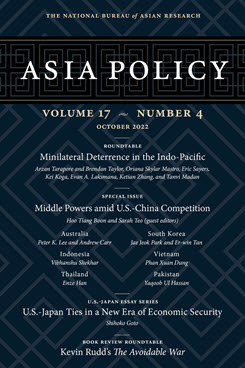Essay in Asia Policy 17.4
Entrenching Authoritarian Rule and Thailand’s Foreign Policy Dilemma as a Middle Power
This essay explores the strategies that Thailand has used to navigate the great-power competition between the U.S. and China as well as the factors that are driving contemporary Thailand’s foreign policy orientation and dilemmas.
EXECUTIVE SUMMARY
MAIN ARGUMENT
Recent Thai governments, whether authoritarian or democratically elected, have maintained amicable relations with Beijing while retaining close military cooperation with Washington. However, domestic political dynamics within Thailand are critical to the past and future trajectory of Thailand’s bilateral relations with the U.S. and China. Bangkok’s reversion toward authoritarian military rule over the past few years has created a different logic in its foreign relations. For the U.S., Thailand’s authoritarian turn, although not to Washington’s liking, can be tolerated as long as Thailand continues to serve U.S. strategic interests in the region. For China, cordial relations with the incumbent military government of Thailand pave the way for closer economic and political relations, yet anti-authoritarian sentiment within Thailand holds China liable and condemns China’s complicity in Thailand’s turn to military rule. Thus, balancing Thailand’s domestic political dynamic with the foreign policy interests of the U.S. and China is the defining feature of Bangkok’s maneuvering act between the two great powers.
POLICY IMPLICATIONS
- As U.S.-China relations grow more tense, countries in Southeast Asia are feeling the squeeze from both sides. These states sense they need to prepare for choosing between the two powers while trying to delay or prevent such a choice from being necessary.
- Thailand’s turn toward domestic authoritarian rule creates a dilemma for both the U.S. and China. For the U.S., there is a need to tolerate an authoritarian government in Bangkok to maintain stable military and security cooperation. For China, Thailand’s domestic political situation creates a backlash against Chinese interests in the country.
- The current military government in Thailand is likely to prioritize its own domestic political legitimacy over relations with either power and will take advantage of the Sino-U.S. competition however best suits its own regime survival.
- If Thailand reverts to a democratically elected government with popular support, healthy relationships with both China and the U.S. are more likely to result and endure.
Enze Han is an Associate Professor at the Department of Politics and Public Administration at the University of Hong Kong (China).
About Asia Policy
Asia Policy is a peer-reviewed scholarly journal presenting policy-relevant academic research on the Asia-Pacific that draws clear and concise conclusions useful to today’s policymakers. Asia Policy is published quarterly in January, April, July, and October and accepts submissions on a rolling basis. Learn more


